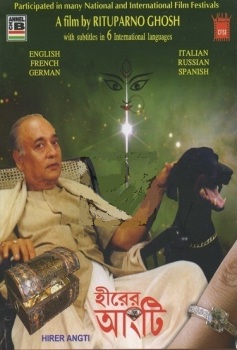
MAHAPRITHIBI opens with a suicide committed by an elderly lady of a family (Gita Sen). Gradually, the unfolding of the reasons as to why she has committed suicide is divulged to us.
Gita Sen had three sons and a daughter, her eldest son got involved in the Naxalite movement and was gunned down by the Police. The death of her son greatly affected Gita Sen. Her daughter-in-law (Aparna Sen), from the marriage of her eldest son , becomes a widow. Before her marriage,Aparna Sen was in a relationship with her husband’s younger brother (Victor Bannerji). Soon after the death of his elder brother, Victor Bannerji leaves for Germany and finds a job for himself in that country.

Victor Bannerji went abroad because his past flame Aparna Sen now lived in their house. This might have hurt Gita Sen, who possibly longed to be close to her other two sons, after her eldest son was killed brutally.The third child of Gita Sen was Anjan Dutta,and Anusya Mazumdar enacted the role of her daughter,with shades of insanity.The third son,Anjan Dutta,was also jobless and this further affected Gita Sen,who was concerned that her youngest son was unable to support himself. Soumitra Chaterji enacts the role of the husband and the patriarch with finesse.
Victor Bannerji encounters difficult times in Germany,with racial attacks,joblessness on the rise in Germany after the fall of the Berlin wall. As in PADATIK, Mrinal Sen uses a lot of newspaper clippings to drive home the point to the viewers that unrest is sweeping Germany.But in his correspondences with his mother,Victor Bannerji gave no inkling of the fact that he is facing hard times in a foreign land. After getting the news that his mother had committed suicide,Victor Bannerji returns home. It is a homecoming for this son with the mother who pined for him now gone forever.
Victor Bannerji is welcomed by his family members,and together they try to wipe out their sorrow and finding solace in each other’s company.
Sen’s MAHAPRITHIBI was on global changing social order.Based on the script by Anjan Dutta,it probed changing social values in those troubled times. Soumitro Chaterji,Gita De,Anjan Dutta,Aparna Sen,Anusya Mazumdar & Victor Banerji comprised the cast.Through this tale of a mother who commits suicide, Mrinal Sen in this film reveals his penchant for exploring fissures in human relationship(as in EK DIN ACHANAK) between individuals bonded by a close tie.The fall of the Berlin wall was knitted into the story. With the fall of communism across the world, Sen in one of his interviews said that he once took pride to call himself a private Marxist, but now he doesn’t have the same courage to call himself the same.
Rating: 3.7 out of 5








 Buddhadeb Dasgupta’s CHARACHAR is based on a story by Prafulla Roy. The film deals with the life of a bird-catcher Lokha played by Rajat Kapur. The film is an exploration of existence caught between ‘reality and a dream.’ The bird catcher’s wife Sari (Laboni Sarkar) leaves him for another man Natobor (Sankar Chakraborty) when his love for birds became overpowering, fuelled by the sensitivity with which his dead son cared for them when he was alive. He gradually detachs himself from the ‘reality’ of modern existence and eventually merges himself at one with his ‘dream’ – becomes exactly like a bird without any worries of the world.
Buddhadeb Dasgupta’s CHARACHAR is based on a story by Prafulla Roy. The film deals with the life of a bird-catcher Lokha played by Rajat Kapur. The film is an exploration of existence caught between ‘reality and a dream.’ The bird catcher’s wife Sari (Laboni Sarkar) leaves him for another man Natobor (Sankar Chakraborty) when his love for birds became overpowering, fuelled by the sensitivity with which his dead son cared for them when he was alive. He gradually detachs himself from the ‘reality’ of modern existence and eventually merges himself at one with his ‘dream’ – becomes exactly like a bird without any worries of the world.